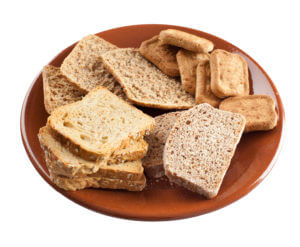Most anyone that has asked a doctor about constipation has probably been told to “consume more fiber”. But is this doing more harm than good?
First let me say that fiber is not bad for you, quite frankly I think most of the studies below are just way to simplistic. The conclusion to be drawn from simply reading them is that people with constipation should avoid all fiber. That (in my opinion) is wrong. Other studies, that look at some specific fibers do not agree with that outcome. It isn’t that fiber is bad for constipation, it’s that some types of fiber are bad for constipation, while some types are very good, but good in a way doctors weren’t expecting.

The thought has always been that fiber gives stool bulk and aids in water retention. Turns out the first assumption makes the problem worse, and the second one isn’t even true.
So now the studies. First, those that say fiber is bad for constipation (and most of these are pretty recent).
“Dietary fiber intake below the recommendation was not associated with constipation” — PubMed #16815488
“Fiber is said to aid in water retention in the colon and results in stools that are less dry and easier to evacuate. However, the reality is that stool moisture content remains at 70%-75% regardless of the amount of fiber and water consumed” — PubMed #PMC3435786
“Patients with chronic constipation may also have worsening symptoms when dietary fiber intake is increased… It has also been our experience that many patients with constipation are already consuming a large amount of fiber before they seek medical attention… Idiopathic constipation and its associated symptoms can be effectively reduced by stopping or even lowering the intake of dietary fiber.” — PubMed #PMC3435786
“Neither the occurrence nor the severity of the most frequent accompanying symptoms of chronic constipation differed significantly between placebo and bran treatments.” — PubMed #7851201
“The benefits of fibre in the treatment of irritable bowel syndrome are marginal for global irritable bowel syndrome symptom improvement and irritable bowel syndrome-related constipation. Soluble and insoluble fibres have different effects on global irritable bowel syndrome symptoms. Indeed, in some cases, insoluble fibres may worsen the clinical outcome.” — PubMed #14984370
“Dietary fiber showed significant advantage over placebo in stool frequency (OR = 1.19; 95%CI: 0.58-1.80, P < 0.05). There was no significant difference in stool consistency, treatment success, laxative use and painful defecation between the two groups.” — PubMed #23326148
“Even when used judiciously, fiber can exacerbate abdominal distension, flatulence, constipation, and diarrhea… It is apparent from trials identified by systematic reviews that there is a relative paucity of high quality evidence to support this approach, especially for insoluble fiber.”
— American Journal of Gastroenterology
Doctors also recommend that people consume more fiber to prevent Diverticulosis. This too seems to be bad advice, with more fiber actually increasing the odds of suffering from Diverticulosis.
A high-fiber diet and increased frequency of bowel movements are associated with greater, rather than lower, prevalence of diverticulosis. Hypotheses regarding risk factors for asymptomatic diverticulosis should be reconsidered. — Gastroenterology Journal
The problem isn’t fiber per se, the problem is the scientific simplistic approach to diet and anything “natural”. Not all fiber is the same, insoluble fiber binds to nutrients and prevents their absorption. It also provides very little in return. Much of it simply passes through without even feeding the microbes we wish to nurture. The belief was that insoluble fiber provides bulk to the stools, making them easier to eliminate, but scientific studies say otherwise. A larger stool is even harder to eliminate. Fiber doesn’t scrub our intestines clean either, yet another myth.
The benefit of fiber in our diet is not a direct one, fiber doesn’t directly benefit us, fiber, especially soluble fiber, feeds our beneficial microbes. These microbes create beneficial nutrients in our gut that feed and nourish it. Insoluble fiber is much harder for bacteria to consume, especially in the limited time it is in our gut. The gas the bacteria produce from soluble fiber is what makes stool soft and flexible by giving it lots of holes (think about the holes in sourdough bread, they’re also produced by microbial gas). Microbes also help to balance the microbiota in the gut to keep pathogens and opportunistic bacteria in check. When we preferentially feed our most beneficial bacteria they out compete, and help eliminate less desirable bacteria, and other microbes, such as the archaea methanobrevibacter smithii which can cause chronic constipated.
“Methanobrevibacter smithii is the predominant methanogen in patients with constipation-predominant IBS and methane on breath.” — PubMed #22573345
“The addition of dietary soluble fibers into supplementary diet can improve the atrophy of the intestinal mucosa and the decline in function of the intestine, constipation and meteorism. The serum diamine oxidase activity, which is regarded as a parameter of intestinal mucosal atrophy, increased with the improvement of constipation and meteorism after addition of dietary soluble fibers.” — PubMed #8392636
“Using in vitro fermentation models to produce estimates of in vivo fiber fermentation, there is evidence that soluble fibers increase the rate of fermentation, increase SCFA production, lower pH… Of the SCFAs, butyrate is the preferred energy source for the colonic mucosa cells and exerts effects on myenteric neurons and motility (63), supporting one mechanism by which a high fiber diet accelerates colonic transit… and increase cholinergic-mediated colonic circular smooth muscle contraction… Butyrate has also been shown to suppress colonic inflammation… There is also evidence that changes in the complex gastrointestinal environment by ingested fiber influence fecal microbiota profiles, perhaps because of the varied production of SCFAs and/or decreases in colonic pH, promoting the growth of beneficial bacteria” — American Journal of Gastroenterology
“In the Arch+ve group, negative correlations were observed between TDF/1000 kcal and fecal total SCFA (r = -0.46; P ≤ 0.01) and between breath methane and fecal total SCFA… The presence of Archaea in humans may influence colonic fermentation by altering SCFA metabolism and fecal SCFA profile.” — PubMed #23739307
There appears to be a lot of evidence that Short Chain Fatty Acids (SCFAs), produced in the colon by beneficial bacteria, can have a very positive affect on colon inflammation and constipation. They may also help to balance the microbiota and control Methanobrevibacter smithii archaea, the primary methane producers in the gut, and the cause of chronic constipation for many people. The best way to obtain these SCFAs is to get the right forms of soluble fiber to the colon. The best forms of fiber are those that our beneficial microbiota prefer and our less desirable bacteria avoid. You want to consume fibers that raise methane and hydrogen gas levels as little as possible, while still contributing to the growth of SCFA producing probiotic bacteria. Though there is little research on this the following fibers have been shown to increase SCFAs and do not worsening SIBO/IBS symptoms: Larch Tree arabinogalactan, Acacia Senegal (e.g. Heather’s Tummy Fiber), Partially Hydrolyzed Guar Gum (PHGG) (NutriSource Fiber Dietary Fiber), and Apple Pectin. There are also many vegetables high in soluble fiber, and we should consume these as much as possible (The Gut Health Protocol has a list of these and far more information on this topic). It is best to consume a variety of these fibers as some bacteria prefer one of the other. You also want some fibers that feed bacteria more at the beginning of the colon, and some that feed bacteria more towards the end. Sounds complicated, but if we naturally consumed a lot of different fiber sources, like our ancestors did, we wouldn’t have to think about it. When supplementing these fibers make sure there is no active SIBO, you don’t want to feed bacteria in the small intestine. Then start small and work your way up.
For you convenience all of these fibers can now be found on The Gut Health Protocol’s Amazon Store. I encourage people to purchase their supplements from the least expensive source, you can use the book’s Amazon store as a reference. If you purchase from the store you’ll get standard Amazon pricing and service and I’ll get a very small percentage of each sell, which you can consider a tip for the many hours of research that goes into these articles.
All images posted by John Herron are either "Copyrighted John Herron", or are copyrighted by someone else and are used under license. So please don’t use them elsewhere, you’ll get in trouble.

 Phage Complete comes with a full 30 day money back guarantee, for U.S. purchases this includes the original shipping charges to you!
Phage Complete comes with a full 30 day money back guarantee, for U.S. purchases this includes the original shipping charges to you!
I LOVE this book! It was such a BIG help to me when I was battling SIBO. Now, I started taking Arabinogalactan and found it is really helping me. I came across your info about the others since I was trying to figure what is best mix to repopulate. I need to go back and read some more in this book as reference. Thank you!
Is this a misprint? If not, I’m confused: “Insoluble fiber is much harder for bacteria to consume, especially in the limited time it is in our gut. The gas the bacteria produce from insoluble fiber is what makes stool soft and flexible buy giving it lots of holes (think about the holes in sourdough bread, they’re also produced by microbial gas). “
Yes, it was a misprint. I’ve corrected it to read “The gas the bacteria produce from soluble fiber is what makes stool soft and flexible buy giving it lots of holes”
Thank you.